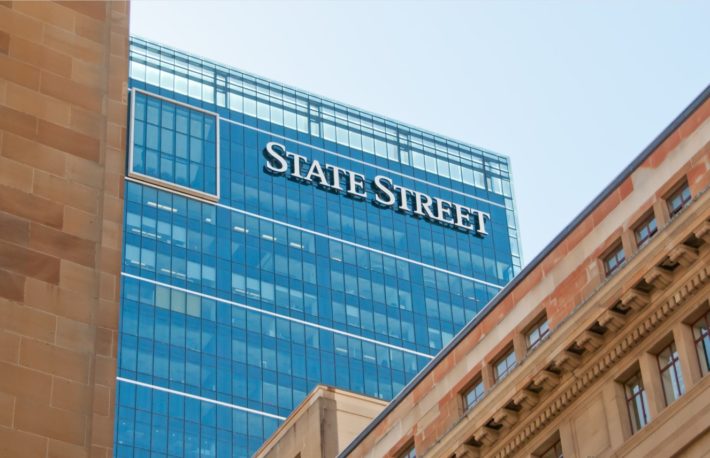Dec 6, 2019 at 18:15 UTC Updated Dec 7, 2019 at 17:33 UTC
The majority of asset managers that bank with State Street are interested in digital assets such as bitcoin, but none have asked the global custodian to store them yet.
“We’re talking to them less about ‘Can you custody this,’ and more about how we can work together to make sure these changes aren’t disruptive to our business models,” said Jay Biancamano, State Street’s managing director of digital product development and innovation.
The firm will have a better idea of what it will do with digital asset custody in 2020, he said at an event sponsored by the bank Thursday in New York. After custody, State Street is interested in looking at fund administration, private placements, issuance and trading of digital assets, he said.
Despite their lack of interest in a custody solution, the Boston-based bank’s clients are continuing to invest more in the new asset class.
According to a survey to be released next week, 94 percent of State Street clients hold digital assets or related products (e.g. bitcoin futures) and 38 percent of them said they will increase their allocation of digital assets in 2020. Forty-five percent said their allocation would stay the same, according to the survey, conducted for the bank this year by quantitative analysis firm Oxford Economics.
State Street is embracing digital assets as it retrenches from an effort to retrofit its plumbing using distributed ledger technology (DLT), a sign that Wall Street is moving away from the mid-decade mantra of “blockchain not bitcoin.”
Earlier this year, the bank laid off more than 100 blockchain developers. This team’s responsibilities were separate from that of Biancamano’s team, however, which focuses on working with clients and third parties around digital asset and tokenization proofs of concept.
“Being able to provide custody and servicing around digital assets is different than building our entire backend infrastructure and prioritizing our technology stack to support Hyperledger blockchain,” Biancamano said. “They were parallel paths. … We can continue to pursue digital assets and go into that business should we need to without having to have a number of DLT engineers. We still have the expertise on staff, but we put less emphasis on the infrastructure piece and more emphasis on the digital asset piece.”
The survey, based on a sample of 101 primarily US-based asset managers and owners, also showed that 62 percent of clients said tokenization will improve risk management and 55 percent said it will enhance security, though only 36 percent said it would democratize investing for retail investors or increase liquidity.
The firm’s clients may also be more bullish on DLT than State Street is. More than half of the respondents (62 percent) said that the technology will be integrated into their trading process in 2020; only half said the same for artificial intelligence. Sixty-five percent said that DLT will improve financing products.
Forty-five percent of survey respondents also said they believe that a bitcoin exchange-traded fund (ETF) will receive U.S. regulatory approval in 2020. However, similar vehicles are already available for big-money investors, Biancamano noted.
“Honestly, institutions already have the ability to invest in these funds,” he said. “VanEck is doing a private placement. WisdomTree announced the ability to invest on the Swiss exchange. I would like to see regulators become more comfortable with a bitcoin ETF… but I think the ability to invest in bitcoin in a fund or directly is there.”




